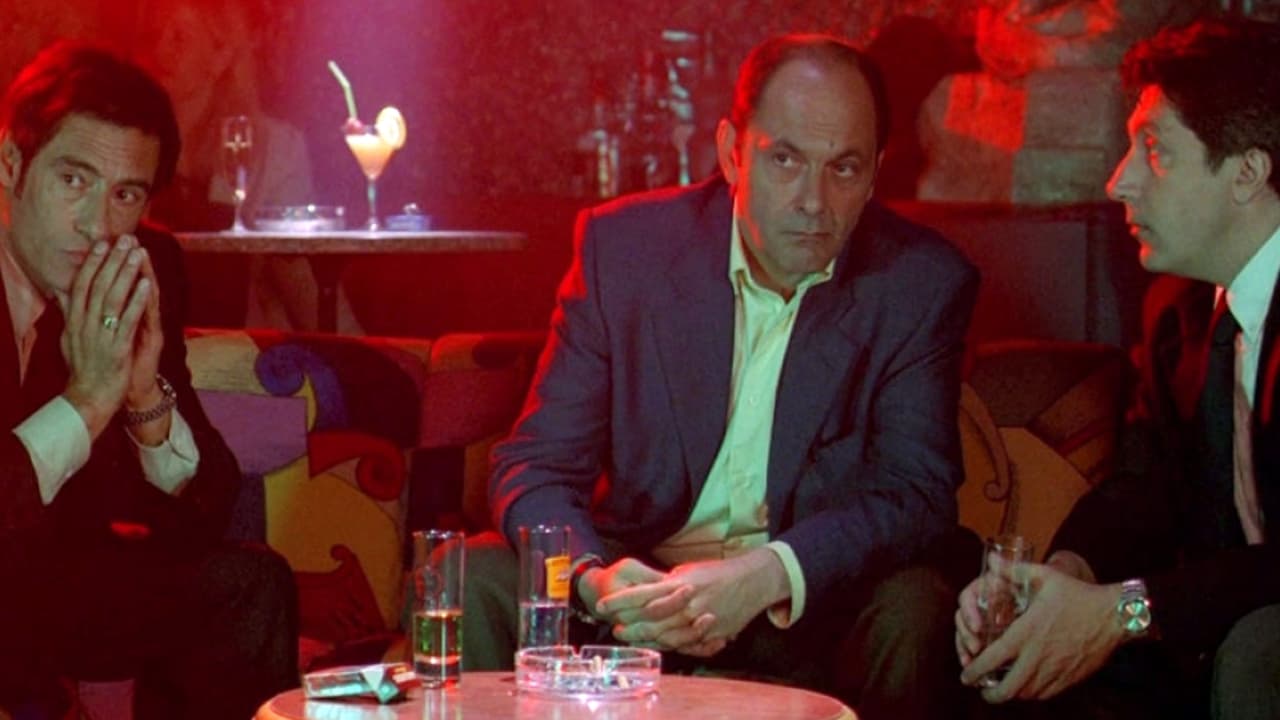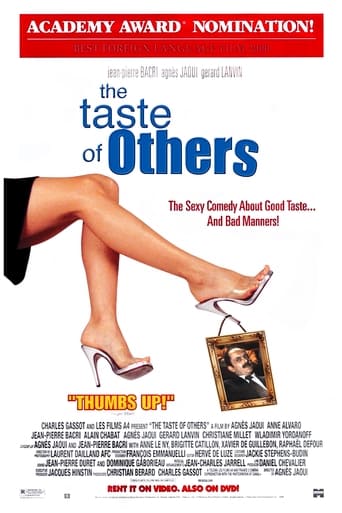CheerupSilver
Very Cool!!!
XoWizIama
Excellent adaptation.
Adeel Hail
Unshakable, witty and deeply felt, the film will be paying emotional dividends for a long, long time.
Marva
It is an exhilarating, distressing, funny and profound film, with one of the more memorable film scores in years,
Alice Wakefield
Or this is how I saw it, eventually. Like Angelique, I'm someone who imposes their taste on others, so it took me a while to catch on. For the first half, I thought this movie was about infidelity, which it isn't really.Someone you thought was a boor can suddenly become a lot more appealing when someone else finds them attractive. It isn't just that the grass is greener on the other side of the fence. It's that others see different things in people.I have a friend who can transform music for me, just by liking it herself. Music that is 'not my taste' comes alive when she says she likes it. Suddenly I become the person with a certain taste to the person with no taste.This is exactly what happens to characters in this movie. Castella is the pivot around which the various characters of this movie turn. He presents as a tactless embarrassment, a nouveau rich (please excuse my French) who travels with a bodyguard, Bruno. Castella doesn't care if Bruno is bored or not; it's his job. And there are other characters. The ones who have the farthest to fall when Castella passes through their lives are those who are quite sure their taste is far superior to his.Funny, subtle, very watchable, and I learnt from it.
adipocea
That may sound so stupidly common, but life is great to watch, life itself, real life, is the greatest show on earth...Not the fantasy, not science fiction, not any form of imagined world, but life just as it is. To make good films, good literature, good fiction, you have to, just like Agnes Jaoui does, observe, select, edit, put on paper and finally on screen small scenes of everyday life.And the result and the final meaning of this is that we are all humans, weak, filled with doubts, longings, ego. Life is miserable but beautiful also. There is a shortage of everything, starting with love and communication, money, power. We , with few exceptions, the great majority of us walking on the streets, filling in the markets, the sideways, sitting on our couches home, in our beds , we are the subject of this great, enormous movie.
noralee
When Hollywood re-makes "The Taste of Others (Le Gout des Autres)" it will just manage to change everything in this delightful Woody Allen meets Eric Rohmer ensemble piece that it will be awful.Here you have chaos theory at work as tiny coincidences of gradually revealed links between people whose lives wouldn't usually intersect (from an ex-cop to artists to a business executive) set off dramatic changes (or consideration of changes) in their lives. Such that something one contact says to another is then taken out of context to cause communication problems when it's passed on to another.A lot of the triumph has to do with director/co-writer Agnes Jaoui's penchant for long shots and her trust in the actors (but then she and her husband--who also co-wrote the script--are also co-stars, though not an on-screen couple). For example, two casual lovers meet up in a restaurant, and the guy introduces her to his co-worker. That sparks fly between the new pair is communicated without close-up leers or touching and with bare conversation. The woe-be-gone boss drags two employees to a strip joint for distraction, and that each guy is at a different stage in his romantic travails is reflected in each's face and body language-- and we never even see the strippers, something Hollywood can never resist showing. We root for the unexpected couples as well as their self-understanding, and they make unexpected yet believable choices. The naturalness of their interactions is laugh-out-loud funny in a knowing way, and breath-catchingly poignant.Those of you intellectuals who are already familiar with "Hedda Gabler" won't be sandbagged by one scene as I was.It deservedly won a slew of French Cesars.(originally written 3/3/2001)
tnrcooper
Agnes Jaoui directs this film which makes a strong case for tolerance-but not simply for liberals and artists and those for whom the claim for tolerance is often made, but also for those who are possibly more old-fashioned or perhaps not as progressive but who just don't realize all the artistic and cultural life in the world.This is a very clever film, well-crafted and even-handed to all. It is about an actress, Clara (played as a jaded, depressed, but ultimately optimistic person by Anne Alvaro) who is "a- woman-of-a-certain-age" and who, while professionally somewhat successful, is lonely and would like to have a child before the window on that opportunity closes. Separately, as the film begins, Castella (director and character Manie (Agnes Jaoui)'s real life husband, Jean-Pierre Bacri) is a successful businessman who is in negotiations for a possibly huge payday with some Iranian businessmen. However, he is frustrated by the routine of his life, and perhaps its predictability, not to mention his shallow, superficial wife Angelique (Christiane Millet), whose main concern in life seems to be the tastefulness of her home. She also, quite humorously, questions the judgment of numerous people whom her spoiled dog attempts to bite. She thinks that the dog is always justified in biting them and obliquely blames them for provoking her dog. This is a funny sub-plot throughout the film.Not surprisingly, Castella is brusque and abrasive, so when he meets Clara who also serves as a private English tutor, he is surprised to discover that, while she is not like most people he knows, he is interested in her and what makes her "tick". He is almost completely culturally ignorant; however when he attends a Shakespeare play a niece is in and finds Clara performing in that, he is suddenly transfixed (attracted not just to her but to the power of the arts-and perhaps he is not even consciously attracted to her at that point-he is just intrigued by the power of the arts). He begins to put extra effort into learning English and also attends her other plays, not only to impress her, but also to better himself. It's clear that he is interested in Clara and increasingly wants to broaden his horizons, particularly from his petty, small-minded wife.One can see that this is another world opening up to him that he was ignorant of but which seems to have shaken him from his cloistered world. Clara is a little-less-than-sure that she appreciates his ever increasing interest in her though. In fact she absolutely is not attracted to him, at least at first, ironically believing him too philistine and brutish. Although well-intentioned, Castella is, as stated, culturally ignorant, and his tastes seem to them too gauche by half. They mock him by maintaining during a dinner conversation that Ibsen was a light-hearted playwright and by pretending to enjoy his bland, juvenile humor while they laugh behind his back. As this happens more and more, Clara becomes more upset with these artistic friends (Wladimir Yordanoff, Xavier de Guillebon, Raphael Dufour, Anne Le Ny) for belittling a man whose interest in their work is, ironically, more serious than their attitudes towards almost everything. While Castella becomes more versed in cultural works, it's not clear that Clara's friends are any more appreciative of his company, although Weber (Xavier de Guillebon) is happy to take the large commission Castella offers him for a fresco on the front of his office. There are misunderstandings on both sides, but what is interesting about this film is that, while Hollywood could not make a film like this without mocking Castella remorselessly, in this film, one ultimately feels more sympathy for him than for the artists who are often the victims of humiliation and harassment. Also crucial to the film, and excellent in their performances, are the director herself, Agnes Jaoui as Manie, a bartender who sells a bit of weed on the side to make ends meet. She is the very definition of a free-spirit, seemingly not overly bothered by anything. She has a fling with Bruno (Alain Chabat), Castella's bodyguard during the negotiations for the Iranian contract. Bruno claims to have bedded 300 women and seems detached and uninvested in relationships. He and Mani have the same sort of attitude toward relationships, it would seem, but he is critical of her selling marijuana and ultimately their relationship proves unsalvageable. Without giving too much away, the ending of the film seems fair, based on what we know about the characters. Jaoui gives all the characters adequate screen time and controls characters' revelations well, allowing for disclosure at a good rate-not disclosing too much too quickly, allowing the characters to mature. Jaoui and Bacri are excellent. Bacri, while I don't know his work, would seem to be a very capable actor. Perhaps it is his resemblance to Peter Sellers, but I thought he would make a fabulous comic actor. He seems to have a wonderful control of playing the straight man, as people such as Leslie Nielsen and Peter Sellers have done so well. Jaoui, I also liked. Apart from the fact she is very cute =) she is the most level-headed in this film, it seems to me, never allowing much to get her too up or too down. An excellent, very insightful meditation on the human condition. Very enjoyable and yet you realize you've seen a very insightful film too. This revelation creeps up on one. I laughed harder at The Dinner Game, but this film is wise as well as being quite amusing in places.

